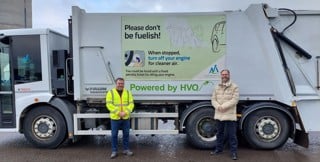Many businesses are still using spreadsheets and paper-based processes to monitor their fleet emissions, according to a new study from Alphabet.
It found UK companies are not equipped to calculate, capture and report fleet emissions.
More than a third (38%) of fleet managers said they still use simple spreadsheets, such as Microsoft Excel, or even paper, to record the emissions of their fleet.
A further 8% admitted that they don’t calculate emissions at all.
Furthermore, less than a fifth (18%) believe their business has the tools it needs to help calculate and report its fleet emissions, while one in eight (12%) said they have no plans to invest in new technology or software to help.
The first results from the research have been announced to coincide with World Environment Day today (Thursday, June 5).
In response to the findings, Ian Turner (pictured below), chief sales officer at Alphabet (GB), said: “Our study reveals that a large number of UK business are either ill-prepared or ill-equipped when it comes to calculating, recording and reporting their vehicle emissions.

“A significant number have acknowledged their uncertainty about what actions they need to take, and when, and what carbon manager tools are available to ensure they remain compliant with new legislation.”
Alphabet’s research also uncovered significant disparities in fleet managers’ knowledge and use of the latest emissions reporting tools across UK industry sectors.
For example, more than 40% of logistics companies – which often have substantial vehicle fleets – still use spreadsheets such as Excel to record emissions, while some delivery services and retailers are still using paper processes.
“The UK’s Streamlined Energy and Carbon Reporting (SECR) framework already mandates large companies to report on their annual energy use, carbon emissions and energy efficiency actions within their directors' report,” explained Turner.
“However, fleet managers of smaller organisations cannot rest on their laurels, as the reporting requirement will almost certainly be extended to include most SMEs (small to medium enterprises) in the future.
“Our study is ‘a wake-up call’ for the whole fleet sector, so businesses should start planning now to identify what tools and processes they need,” Turner concluded.
























Login to comment
Comments
No comments have been made yet.